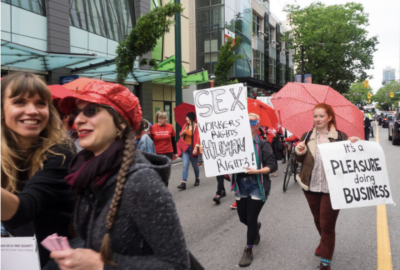Articles
The Anti Porn Laws That Are Killing People – Unbound
There is a bill that recently passed, and it’s been applauded as a “bi-partisan victory for women.” If you’re like me and feel a minor panic attack creeping with every iPhone news update, you might have appreciated a blip of seemingly good news. Perhaps you even “liked” or retweeted about it.
The bills are called the “Stop Enabling Sex Trafficking Act” and the “Fight Online Sex Trafficking Act,” and these bills passed 97-2 because nobody wants to vote No on bills with names like these, because we all want to stand against sex trafficking, right?
But SESTA and FOSTA are going to kill people, particularly women, trans youth, POC, and queer youth. These bills are the reason that Microsoft will be monitoring user’s Skype calls after May 1st, searching for “obscenity and profanity.” SESTA and FOSTA are the reason that Facebook is banning or blocking users for trading consensual nudes. SESTA and FOSTA are why Google Drive is deleting the content of users, for “obscenity.”
So what do these laws actually do? If the words “third party platform” sound boring, I feel that. Facebook, Instagram, Google Drive, and Skype are all platforms through which users send content between two other parties, making those platforms above the “third party.” Example: If I send a nude of myself to my boyfriend through Instagram DM, I’ve just utilized IG as a third party platform.
SESTA + FOSTA do several things:
They make no distinction between sex work and sex trafficking. Sex work is consensual work. Trafficking is the forced or coerced sexual servitude of a person by another.
At this point, I should mention that I’m a sex worker, and have been for some time. “Sex worker” is an umbrella term for consensual labor that is often sexual in nature; stripping, webcamming, and pornography are just a few of the types of work that I do.
Now that the law sees consensual sex and sexual slavery as synonymous, no third-party platform company wants to be responsible for any illegal content that is transferred or advertised.
So whether it’s a civilian like you sending a nude to your boyfriend for free, or a sex worker like me sending a nude to my client for money, no major website or platform wants to be held liable for the transfer of that media.
Now that Facebook and Instagram and Google and Microsoft don’t want to be held liable and charged with “promoting prostitution” like the creators ofBackpage, these companies are deleting or banning all sexually-relevant content to cover their asses. Even sex educators and erotica writers are finding their posts removed from Facebook and Instagram. This is a loss of information and art.
This is one reason why the Department of Justice opposed SESTA and FOSTA, saying, calling it “unconstitutional” and pointed out that the bill would not help to find or prosecute pimps or traffickers, by conflating all commercial sex trade as a crime.
Rob Portman, the Republican Senator from Ohio stated without evidence that all trafficking was sourced to Backpage. In truth, Backpage was a way for sex workers to communicate with each other about good and bad clients, and to be able to make income. It kept people safe, and now it’s gone.
Criminalizing consensual acts drives the (already marginalized) workers underground.
If I as a provider can no longer manage my clients through a third-party website like Facebook, Backpage, and if I severely need money to work, I’m more likely to accept when someone like a manager [or a pimp] offers to help book me, and of course, take a cut of my income, and take control over my clients. This means less money and autonomy and safety for the worker.
As a white woman who is able-bodied and hetero-presenting, I have more options in finding employment than many people who do sex work under capitalism. And criminalization always impacts women, trans and queer youth and people of color the most.
Journalist Brooklyn White says, “People have a tough time understanding the difficulty of existing as a woman of color, queer person, or trans person, and don’t often recognize the relationship between capitalism, power, and sex. [These bills] criminalize an industry that mainly affects these three groups.” And, victims of sexual assault are less likely to seek help from law enforcement or health care if the activities that they participate in to survive under capitalism are marked as illegal.
If you recall anything about American history class: Prohibition didn’t end alcohol production, it only shuttered legal businesses and put the gangsters in control. Similarly with the criminalization of sex work: you give more power to the pimps.
And it doesn’t matter if you think that sex-related jobs are “yucky”; that just means it isn’t the job for you. I can’t imagine being a wedding planner or orthodontist, and so, I don’t. And I certainly don’t shame or punish people for their jobs or methods of income either.
So how do we direct resources to trafficking victims? How do we stop the death and violence against queer youth, trans youth and youth of color, poor women and working parents? We fight to decriminalize consensual sale of sex.
There is no “end demand” model that doesn’t harm sex workers and people engaging in survival sex work. There is no “partial criminalization” model that doesn’t harm sex workers and people engaging in survival sex work. As a feminist dedicated to acknowledging my white privilege and to productively channeling my inherited power; I ask of you to fight for human rights and sexual freedom. People should always be free and able to engage in the labor that they choose under capitalism.
If you’ve read this far, I beg of you to share, tweet, or email at any representative who conflates sex slavery with sex work and ask them if they understand consent. The differences between the two can mean life and death for the people most impacted because the world will be a very scary place if we continue to ignore the differences between consensual labor, and slavery.
Originally published on Unboundbabes.com























Leave a reply